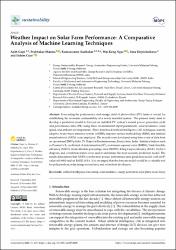| dc.contributor.author | Gopi, Ajith | |
| dc.contributor.author | Sharma, Prabhakar | |
| dc.contributor.author | Sudhakar, Kumarasamy | |
| dc.contributor.author | Ngui, Wai Keng | |
| dc.contributor.author | Kirpichnikova, Irina M. | |
| dc.contributor.author | Cüce, Erdem | |
| dc.date.accessioned | 2023-09-06T10:44:56Z | |
| dc.date.available | 2023-09-06T10:44:56Z | |
| dc.date.issued | 2023 | en_US |
| dc.identifier.citation | Gopi, A., Sharma, P., Sudhakar, K., Ngui, W.K., Kirpichnikova, I. & Cüce, E. (2023). Weather Impact on Solar Farm Performance: A Comparative Analysis of Machine Learning Techniques. Sustainability, 15(1), 439. https://doi.org/10.3390/su15010439 | en_US |
| dc.identifier.issn | 2071-1050 | |
| dc.identifier.uri | https://doi.org/10.3390/su15010439 | |
| dc.identifier.uri | https://hdl.handle.net/11436/8275 | |
| dc.description.abstract | Forecasting the performance and energy yield of photovoltaic (PV) farms is crucial for establishing the economic sustainability of a newly installed system. The present study aims to develop a prediction model to forecast an installed PV system's annual power generation yield and performance ratio (PR) using three environmental input parameters: solar irradiance, wind speed, and ambient air temperature. Three data-based artificial intelligence (AI) techniques, namely, adaptive neuro-fuzzy inference system (ANFIS), response surface methodology (RSM), and artificial neural network (ANN), were employed. The models were developed using three years of data from an operational 2MWp Solar PV Project at Kuzhalmannam, Kerala state, India. Statistical indices such as Pearson's R, coefficient of determination (R-2), root-mean-squared error (RMSE), Nash-Sutcliffe efficiency (NSCE), mean absolute-percentage error (MAPE), Kling-Gupta efficiency (KGE), Taylor's diagram, and correlation matrix were used to determine the most accurate prediction model. The results demonstrate that ANFIS was the most precise performance ratio prediction model, with an R-2 value of 0.9830 and an RMSE of 0.6. It is envisaged that the forecast model would be a valuable tool for policymakers, solar energy researchers, and solar farm developers. | en_US |
| dc.language.iso | eng | en_US |
| dc.publisher | MDPI | en_US |
| dc.rights | info:eu-repo/semantics/openAccess | en_US |
| dc.subject | Artificial intelligence | en_US |
| dc.subject | Forecasting | en_US |
| dc.subject | Solar irradiance | en_US |
| dc.subject | Energy generation | en_US |
| dc.subject | Solar plant | en_US |
| dc.subject | Neuro-fuzzy | en_US |
| dc.title | Weather impact on solar farm performance: A comparative analysis of machine learning techniques | en_US |
| dc.type | article | en_US |
| dc.contributor.department | RTEÜ, Mühendislik ve Mimarlık Fakültesi, Makine Mühendisliği Bölümü | en_US |
| dc.contributor.institutionauthor | Cüce, Erdem | |
| dc.identifier.doi | 10.3390/su15010439 | en_US |
| dc.identifier.volume | 15 | en_US |
| dc.identifier.issue | 1 | en_US |
| dc.identifier.startpage | 439 | en_US |
| dc.relation.journal | Sustainability | en_US |
| dc.relation.publicationcategory | Makale - Uluslararası Hakemli Dergi - İdari Personel ve Öğrenci | en_US |


















